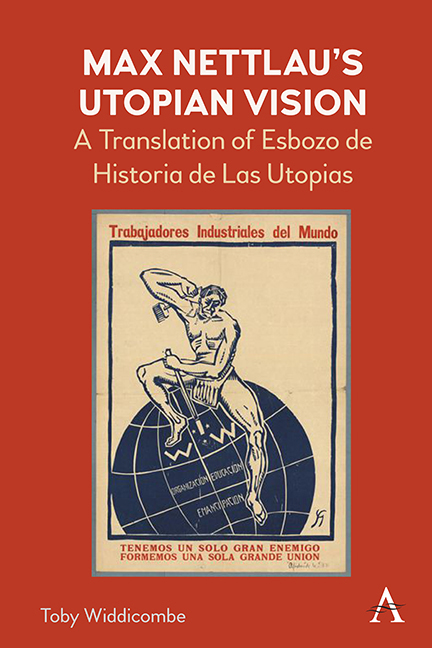Book contents
- Frontmatter
- Dedication
- Contents
- Preface
- Acknowledgments
- Introduction
- Outline of the History of Utopias
- 1 Definition
- 2 The Classical and Medieval Ages
- 3 The Renaissance and Neo-Classical Periods
- 4 The Nineteenth Century (to 1888)
- 5 1888 to the Twentieth Century
- 6 The Twentieth Century: 1900–1925
- Notes
- Appendix A Select Nettlau Bibliography
- Appendix B An Annotated Gazetteer of Nettlau’s Utopians
- Appendix C List of Intentional Communities in Esbozo
- Appendix D List of Utopian Newspapers and Journals in Esbozo
- Bibliography
- Index
Preface
Published online by Cambridge University Press: 18 November 2023
- Frontmatter
- Dedication
- Contents
- Preface
- Acknowledgments
- Introduction
- Outline of the History of Utopias
- 1 Definition
- 2 The Classical and Medieval Ages
- 3 The Renaissance and Neo-Classical Periods
- 4 The Nineteenth Century (to 1888)
- 5 1888 to the Twentieth Century
- 6 The Twentieth Century: 1900–1925
- Notes
- Appendix A Select Nettlau Bibliography
- Appendix B An Annotated Gazetteer of Nettlau’s Utopians
- Appendix C List of Intentional Communities in Esbozo
- Appendix D List of Utopian Newspapers and Journals in Esbozo
- Bibliography
- Index
Summary
This is a book that has been three decades in the making. Back in 1992, I wrote a featured essay for Utopian Studies on histories of utopia to 1950. Nettlau's book was one of those I listed and briefly discussed. I have persisted with an edition of Esbozo de historia de las utopías over the years (despite delays and the creation of many other books and articles) because it profoundly matters that there is a tradition over more than 2500 years of people giving expression to a desire for social betterment—whether by means of written works or the creation and sustaining of intentional communities. It matters now, in particular, as the earth under late capitalism is becoming more and more unlivable. It matters, too, that a little heard voice can, for a moment or two, be heard above the better-known words of Lewis Mumford, Krishan Kumar, Ruth Levitas, and Frank and Fritzie Manuel so as to give to a wellknown story an anarchist spin, a spin which began more than 70 years ago with Marie-Louise Berneri's brief account: Journey through Utopia. Max Nettlau, as this book will show, is an original.
It matters for one final reason too. I have been struck by this simple fact: of the hundreds of utopian and anarchist thinkers and writers mentioned by Nettlau, I have been unable to provide even the most basic information (birth and death dates, nationality, amateur and professional interests, and so on) for more than 50 and little information for many. They have, even in this age of information, vanished from the historical record as if they never were. Yet, these women and men mattered to themselves, to their families, to their loved ones, to their friends. They devoted themselves to the achievement of ideas. They are gone. Unintentionally, this book is philosophically about transience. The great antidote to egotism is, surely, the realization that oblivion awaits many of us, and that realization makes the cause of social betterment more not less pressing.
As to the organization of this edition, I hope it is reasonably self-evident. I begin with an introduction which presents a chronology of Nettlau's life, Nettlau's ideas about anarchism and utopian thought, the argument of the Outline (Esbozo), and the copy-texts and editorial principles I have used in this edition.
- Type
- Chapter
- Information
- Max Nettlau's Utopian VisionA Translation of Esbozo de Historia de Las Utopias, pp. ix - xPublisher: Anthem PressPrint publication year: 2023

